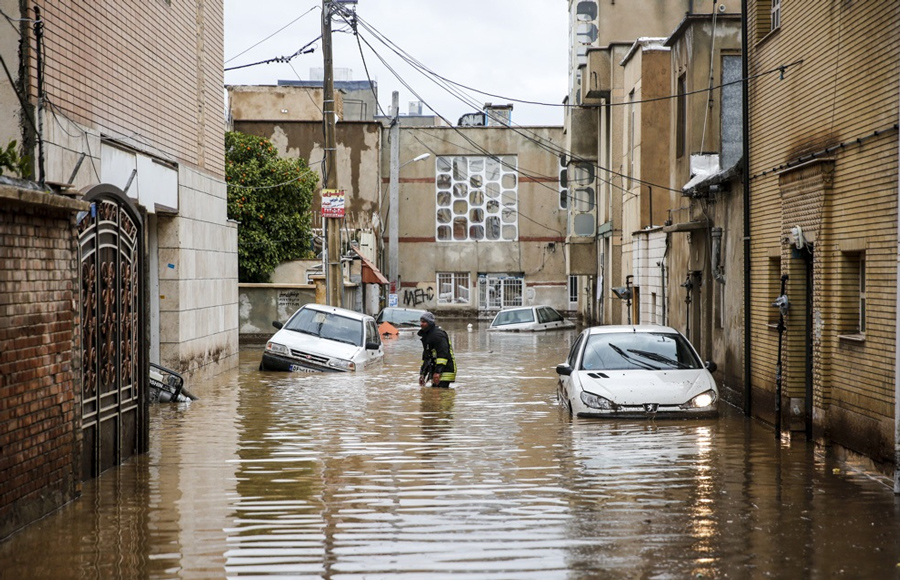|
In this mailing:
- Uzay Bulut: Nigeria: Jihad
against Christians
- Amir Taheri: When the
Ayatollah Plays His Joker
by Uzay Bulut • April 21, 2019 at
5:00 am
- The current
violence, which has been getting worse since early 2017,
"is slightly different, in that it is a series of
targeted attacks on Christian communities attempting to
displace farmers and take land for herders." — Nathan
Johnson, International Christian Concern, Regional Manager for
Africa.
- "Christians in
Nigeria are treated as second-class citizens in the twelve
northern states, where sharia law is implemented. They are
victimized in many ways. Christian girls are kidnapped and
forced into marriage to Muslim men. Pastors are abducted for
ransom. Churches are vandalized or completely destroyed."
— Nathan Johnson.
- "The Nigerian
government and the international community... have from the
start done little to address the situation. This lack of
participation is not surprising: they cannot even acknowledge
its roots, namely, the intolerant ideology of jihad. As a
result, the death toll of Christians has only risen -- and
will likely continue to grow exponentially -- until such time
that this reality is not only acknowledged but
addressed." — Raymond Ibrahim, author and Middle East
expert.

Christians
are being massacred in Nigeria by Fulani and Boko Haram jihadists
-- and no one gives a damn. Pictured: Boko Haram leader Abubakar
Shekau, from a November 2018 Boko Haram propaganda video.
Christians are being massacred in Nigeria by Fulani
and Boko Haram jihadists -- and no one gives a damn.
The most severe persecution of these defenseless
Christians -- who make up half of Nigeria's total population -- has
been taking place mostly in the Muslim north of the country, which
is governed by sharia law, and in the states known as the
"Middle Belt," which are a transition zone between the
northern and southern states.
According to the human rights organization
International Christian Concern (ICC):
"Fulani militants continued to carry out
violent attacks throughout Nigeria's Middle Belt region in March.
The brutal attacks perpetrated by these hardline Islamic militants
persistently spark fear among Christians living in the Middle Belt,
as death tolls continue to rise... Last month [February], at least
150 people were killed.
by Amir Taheri • April 21, 2019
at 4:00 am
- The summoning of
Iraqi mercenaries showed that Khamenei isn't quite sure of the
regime's military and security apparatus and, when the chips
are down, relies on his foreign legion.
- Soon, however, it
became clear that "Islam's bravest soldier since Imam
Ali," Major-General Qassem Soleimani, owed part of his
reputation to bluffing and his talent for self-aggrandizement.
- Western gullibility
has contributed to overrating a brutal regime and a mediocre
leader, thus helping spread the fear that such regimes and
leaders rely upon for their survival.
The first
week of recent floods in Iran, with chaos and confusion, showed
that, despite boasts by its commanders, the Islamic Revolutionary
Guard Corps (IRGC) was unable to organize a credible rescue
operation. Pictured: Flooding in Shiraz, Iran on March 25, 2019.
(Image source: Fars News/Wikimedia Commons)
For years, "Iran experts" in the West have
regarded the Islamic Revolutionary Guard Corps (IRGC) as the
"deep government" in the Islamic Republic. However, the
events of the past weeks, marked by floods that wreaked havoc in 22
of Iran's 31 provinces, may warrant a second look at that theory. The
floods showed that, in real terms, Iran has no government and that
the IRGC is more of a business-cum-security conglomerate than a
government, deep or shallow.
The first week of chaos and confusion showed that,
despite boasts by its commanders, the IRGC was unable to organize a
credible rescue operation. IRGC chief Gen. Muhammad-Ali
Aziz-Jaafari was even unable to travel to the affected provinces.
Then came small but ominous protests by flood-stricken people
against the IRGC, blaming it, rightly or wrongly, for causing the
floods by jerry-building dams and railway lines.
|




No comments:
Post a Comment